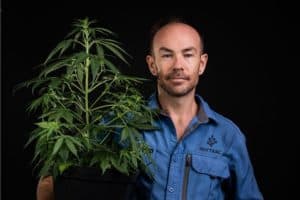As humans build cities, expand populations, and establish new industries, we create degrade land, contaminated soil, and wastewater sludge. In New Zealand alone, we produce more than 300,000 tonnes of wastewater sludge annually and spend more than $40 million per year trucking it and burying it in landfills.
This dig, truck, dump solution is commonplace but not sustainable. It comes at an economic and environmental cost sometimes so great that sites with contaminated soil are left unremedied. Polluted soils put ecosystems at risk and jeopardise food supplies and income. There is mounting global pressure to address this problem sustainably.
 This is where Owen Darby’s company Phytrac and their new partnership with Bridgewest Ventures come in. Phytrac believes phytotechnology, the ability for plants to act like a sponge and soak up contaminants in soils, can help clean up our land and restore our ecosystems. Bridgewest Ventures wants to help bring this technology to the world.
This is where Owen Darby’s company Phytrac and their new partnership with Bridgewest Ventures come in. Phytrac believes phytotechnology, the ability for plants to act like a sponge and soak up contaminants in soils, can help clean up our land and restore our ecosystems. Bridgewest Ventures wants to help bring this technology to the world.
“Plants eat metals, they naturally extract, degrade and manage inorganic and organic contaminants like phosphorus, nitrates, zinc, or copper.”
While phytotechnology itself is not new, the idea of a comprehensive platform to guide, support, and optimise the science of it, is. Phytotechnology is challenging to implement effectively. Many people use a ‘plant and pray’ method, or haphazard based on plant aesthetics. Phytrac looks to optimise the process and give the power of understanding to users, an understanding of the biological algorithms based on all the variables of the system. To Owen, it is all about planting with purpose.
“We are creating a technology platform to provide the user with sustainable options for managing their contaminated sites and waste streams. Phytrac will provide action plans, maintenance schedules, and IoT monitoring abilities.”
Phytrac’s solution guides companies to plant sunflowers, hemp, natives, and other plants strategically on a polluted site, along with soil preparation process, working towards removing or stabilizing contaminants and restoring an ecological balance. A customised planting schedule is key to optimising the phytotechnology performance as some plants are hungrier than others and some areas on a site have more contaminates of varying bioavailability.
Big impact is what drove Owen Darby to deep tech entrepreneurship in the first place.
“We are creating and introducing tools for others to use. Others can fix the land themselves, and the impact will be far more widespread than if we were acting as consultants. I wanted a career that was going to fulfill my desires to have a positive impact, I wanted to create something that is going to be a future technology. The only way I felt like that was going to happen was if I built it myself.”
Before Phytrac, Owen had a long-term career providing technical solutions for the energy sector. His experience provided great personal insight into waste streams generated by industrial activity.
Seeing a linear industry in action inspired Owen to look for circular solutions. Now, he is excited to be fixing environmental problems instead of energy related ones. The first step in their go-to-market plan is research and data collection. They are studying plants and soil to refine the baseline data that drives the algorithms behind their platform.
Phytrac operates out of their state-of-the-art lab in the Queenstown Lakes District region, where they are working collaboratively on a number of projects to effectively unlock large tracts of land for safe, high-value use.
As with other deep tech ventures in New Zealand, Owen recognises the opportunity to export his technology. The partnership with Bridgewest Ventures will help make this possible.
“We’re international from day one. The connections Bridgewest Ventures brings through their investment will give us the opportunity to export Phytrac to North America and eventually Europe, where the technology is desperately needed.”
Owen is also passionate about growing the tech industry in Queenstown.
“Queenstown could easily be a technology hub, it’s vital that we move away from the mono-tourism economy and bring other opportunities to our region. I’m excited Phytrac gets to be part of that.”